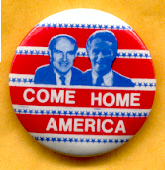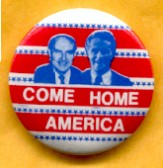BURNED-OVER DISTRICT, NY. In the fall of 1995, as my 105-year-old friend Henry W. Clune lay dying, America’s oldest living novelist asked me to run my fingertip along the spines of his dozen or so books, which occupied a shelf in his bedroom. (Henry was the usual Upstate authorial mix of vanity and self-deprecation.)
“Not bad,” he grinned as my finger tickled his oeuvre. (I don’t usually tickle oeuvres, but in this case I made an exception.)
Henry was born in the mild morn before the storm clouds of empire rolled in. He admitted to wearing a “Remember the Maine” button in 1898, but hey, he was just a kid. When I was 8, I cried when Hubert “[Vietnam] is our great adventure—and a wonderful one it is!” Humphrey lost to Richard Nixon.
Henry passed a few mercifully quiet hours on the front during World War I, from which he emerged an admirer of the Socialist Eugene V. Debs. The noble Debs, a patriot of Terre Haute, Indiana, spent almost three years in a federal prison for a Hall of Fame-worthy 1918 speech in which he told an audience in Canton, Ohio, “you are fit for something better than slavery and cannon fodder.” (Priggish despot Woodrow Wilson refused to release Debs after the war; that act of justice was left to a far better man, the peaceful Warren G. Harding, whose paperboy in Marion, Ohio, Norman Thomas, would succeed Debs as America’s leading Socialist.)
Things got bad, and things got worse—I guess you know the tune.
The War Party called the Peace Party Nazis in 1941, Communists in 1951, Soviet dupes in 1961, dirty hippies in 1971 … must I go on? In 2011, those who heed George Washington’s counsel to seek “peace and harmony with all” will be called mullah-headed appeasers of Irano-fascism.
We live in an age in which one is free to view pornography that would make de Sade wince and gore that would make Leatherface retch, yet we have less “free speech,” as the Founders would have conceived it, than ever before. The range of permissible political opinions has narrowed to encompass the rat-hair’s breadth separating Mitt Romney from Joe Lieberman, and woe betide the straggler who wanders away from the cage.
Blame war. Blame TV. Blame the nationalization of political discourse, as regional variations and individual peculiarities are washed away by the generic slime of poli-talk shows. Radicals—even naïve Tea Partiers or idealistic left-wing kids—are dehumanized in ways unthinkable when America was a free country. No one was barred from the conversation back when there was a conversation. No dispatch ever read, “Wingnut Henry David Thoreau today issued a manifesto from his compound near Walden Pond…”
Which reminds me: I have a book due out in July—Bye Bye, Miss American Empire, my typical melange of Little American history, tendentious journalism, and bad puns, this time about breaking up our national and state leviathans into more manageable pieces. In the 1970s—ah, golden youth—a book wondering if we need both more states (Upper New York, Southern California, Jefferson) and fewer states (aloha, Hawaii and Alaska—maybe Vermont, too) would have been greeted with “Wow, man, that’s kinda interesting,” but my opuscule will, I expect, be treated as though I am advocating the colonization of Neptune.
The squeezing out even of establishment dissent—especially since 9/11—has left us with an antiwar movement so feeble it makes the Esperanto lobby look like the AARP. Enter the new organization Come Home, America, its name taken from the magnificent 1972 acceptance speech delivered by George McGovern in the last unscripted Democratic convention.
Discussed in recent issues of this magazine,* Come Home, America is based on the now decidedly radical premise that young men and women belong home, with their families and in their communities, rather than fighting needless wars on the other side of the globe. I am a small part of what I hope will become a chorus of patriotic dissent ringing from Main Street and Copperhead Road and Martin Luther King Boulevard, from farm and church and coffeehouse.
“We should be together,” as Grace Slick and Jefferson Airplane sang. Henry W. Clune agreed. As rock-ribbed a Republican as ever dressed for dinner at the club, Henry published in the Rochester newspaper a blistering attack on the Vietnam War as immoral. He read Marquand and Cozzens, not Marcuse and Hoffman, but even as a proud bourgeois elder he took his stand with the shaggy kids in the streets.
As Grace Slick also sang, “Tear down the walls.”
* From the August 1, 2010, issue of the highly recommended American Conservative (www.amconmag.com)
** BLOCK PARTY WEEKEND SPECIAL: Independence Day ditties from the aforementioned Jefferson Airplane (http://www.youtube.com/watch?v=6ljxpyH4dnA) and out on Copperhead Road (http://www.youtube.com/watch?v=xvaEJzoaYZk) —note intergenerational porch montage. Have a rebellious Fourth!



I am not certain that your conflation of the Spanish-American War, the Great War, the Second World War, Red Scares, and Vietnam is entirely fair or accurate. That aside, it’s a very good piece (I started to write “peace” in an interesting synchronicity).
Lighter note stuff about Debs. Bear with me. I was surprised to read that Albert Schweitzer was an older cousin of Jean-Paul Sartre and was bemused by the image of a dapper young man Schweitzer pushing a perambulator with the baby Sartre (an unpleasant image, frankly) in it about Paris as once he did. Further Schweitzer’s mom kept in contact all her life with her cousin who emigrated to the US, one Eugene Debs. Communicated merely for entertainment value.
I am inordinately pleased that you have another book coming out.
Mr. McCullough,
I am inordinately pleased by that anecdote.
What a perfect Fourth of July piece. You made my day. Thanks.
Amen.
(Looking forward to the book!)
“No one was barred from the conversation back when there was a conversation.”
Tell that to the Loyalists during the Revolutionary War. Or the anti-war movement in the north during the Civil War.
There was never some golden age when voices of dissent were always listened to with careful respect.
That isn’t to say that you aren’t right about things being a lot more straight-jacketed these days than they were at certain times in the past. I think you’re right that our discourse has become a lot more narrow in the past few decades.
I was wondering what became of the Anti-war lobby. Why from 2002 until 2008, they kept up a constant presence here in Minneapolis, protesting our involvement in Afghanistan, and Iraq. After Mr. Obama was elected and pulled our troops out, they apparently disbanded. Huh? What’s that you say? Our troops are still in Iraq and Afghanistan? Why didn’t anybody mention this before!
Sorry. Pathetic attempt at humor. If only I could find humor in our Imperial Adventures. My point is that even our “anti-war” movement was co-opted and became just another shrill voice of the opposition party, convenient for use as stock footage of “lefty wing nuts” on the Poli-talk TV Info-tainment shows. Now that the supposed “anti-war” party is in charge, we have switched to stock footage of “Tea Bag nutters” waving “Don’t Tread on Me” flags.
Sadly, true dissenters, and true conversation are something I have only read about in books. I’m looking forward to your latest.
Thomas G. touches on what most bothers me about our discursive culture, falsehood and the tolerance of falsehood in service to the right way of thinking. Its classic form is how both the left and right in the thirties suppressed negative information about fascists (they’re a bulwark against communism) and communists (just occasional excesses on the way towards the worker’s paradise.) It still goes on. Right wingers lament (reasonably) at the vicious slashing of GW Bush and with the same breath viciously slash Obama. Intelligent conservatives will refrain from noting the obvious fact that Anne Coulter is a snarling, lying beast. Lefties will likewise overlook the misrepresentations and twists of the buffoonery of Michael Moore.
A recent essay here by John Wilson, “Why I am a Conservative,” summoned up a plethora of comments that, eventually, I found depressingly diffuse. In a sort of response, I made a short list of persons I think are right and good. Only three are alive and might be considered political: John Lukacs, Wendell Berry and Bill Kauffman. I am looking forward to Bill’s next book because he is in that rare treasured category, “Not a Liar.”
“The greatest joy in life for a man is to drive his enemies before him, to leave their cities in smoking ruins, to hear the wailing and cries of their wives and children, to ride their horses, and snore loudly upon the bosoms of their concubines.”
Enter the new organization Come Home, America
Comments are closed.